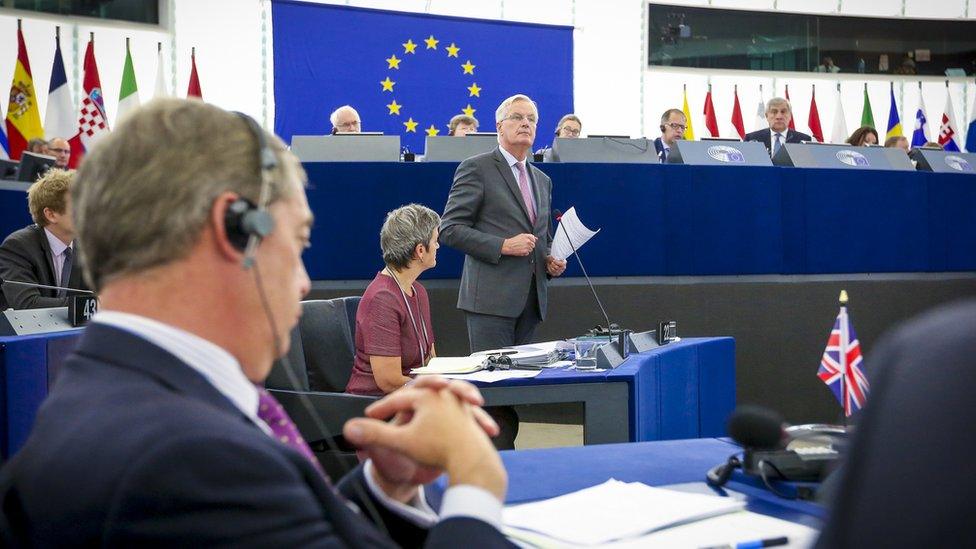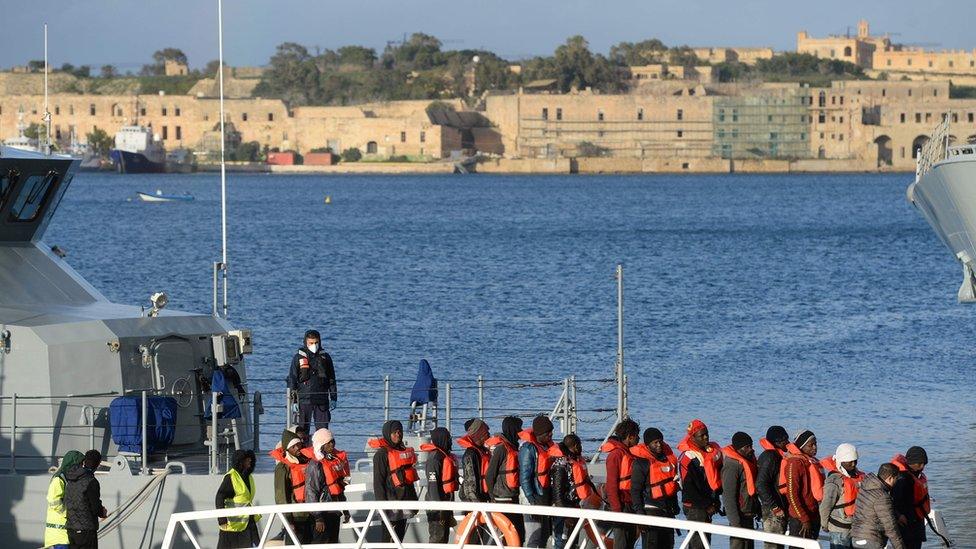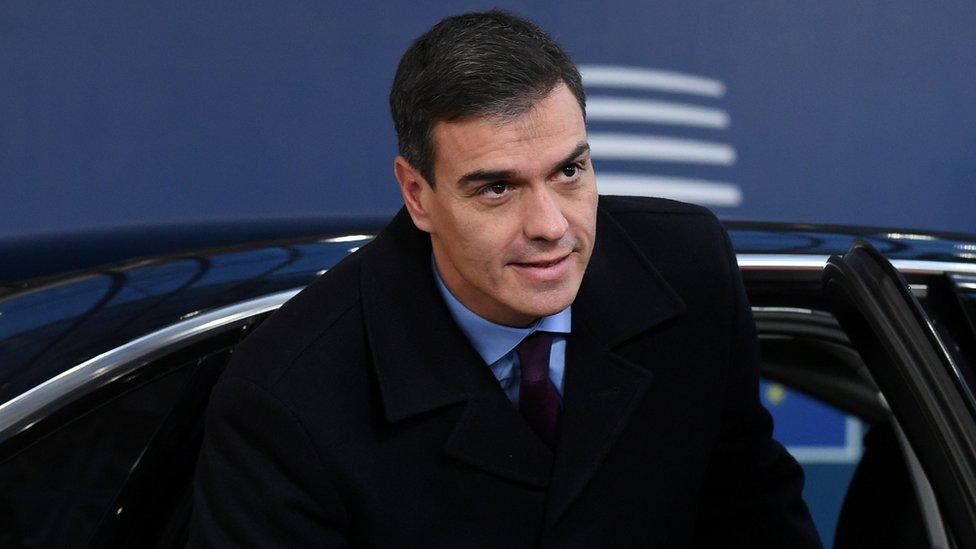Week ahead in the European Parliament
- Published

Almost as if it never left, Brexit is back on the agenda for the European Parliament at its first full sitting since the Christmas break.
A short debate has been scheduled on Wednesday morning to allow leading MEPs to react to the result of this week's big vote in the Commons.
The leaders of the assembly's political groups have already insisted the UK's deal with the EU cannot now be renegotiated.
It will be interesting to see if that line holds if the deal is rejected comprehensively - and if MEPs offer any alternative routes out of an impasse.
The European Parliament has its own ratification procedure, external to get through before the end of March, and five-yearly elections are due in May.
In addition, there's a steady drip of Brexit planning legislation that needs to make its way onto the EU statute book in the next few weeks.
This week MEPs will vote on shrinking the European Investment Bank's board of directors, and endorse a deal on splitting tariff rate quotas, external.
Aside from Brexit, Spanish Prime Minister Pedro Sanchez will offer his vision for the future of the EU on Wednesday.
And Romanian PM Viorica Dancila will on Tuesday lay out her government's priorities for Romania's upcoming six-month stint at the helm of the EU presidency.
Here are the main events coming up this week...
Monday
The sitting begins with a debate on the final report from a temporary committee investigating the EU's procedure for authorising pesticides.
The committee was set up last year following the controversy surrounding the licence renewal of glyphosate, a widely used weedkiller.
The report recommends granting the public greater access to scientific studies used in authorisation cases, and a ban on using pesticides in public areas.

Nine EU countries voted against renewing a licence for glyphosate
After this MEPs will discuss proposals to soften the existing restrictions on firms that want to hire a vehicle from a company in another EU country.
MEPs backed an amended version of the proposal last June, but it has faced opposition from some states worried about a loss of tax revenue on vehicle registrations.
They will put their position to a 'first reading' vote on Tuesday, meaning EU governments will have to respond to it within four months.
Then comes a debate on a report from the women's rights committee about "gender mainstreaming" in the European Parliament.
Among its recommendations: that after this year's European elections, the assembly's political groups should each have one male and one female leader.
In the evening they will debate five 'own initiative' reports - advisory reports from various committees with ideas for new EU policies.
One of them calls on the Commission to give carmakers more legal certainty over data protection rules to prompt growth in the driverless car industry.
Tuesday
First up in the morning, MEPs will pick over the bones of last month's EU leaders' summit in Brussels, where they said the Brexit deal is not open to renegotiation.
Leaders also discussed work on the EU's next long-term budget, migration, climate change, and tensions with Russia over the Sea of Azov.
After this they will debate the continuing deadlock over reform of the EU's Dublin migration rules.
The European Commission and Parliament want to change the regulation to create a permanent system for redistributing migrants between EU states.
However these proposals have foundered in the face of opposition from central and eastern European countries.

Malta recently reached a deal with eight EU countries over 49 migrants stranded at sea
Following that, Austrian Chancellor Sebastian Kurz will join MEPs to review Austria's six-months in the EU's rotating presidency, which ended this month.
A busy morning session will then conclude with a series of speeches from senior EU figures to mark the 20th anniversary of the introduction of the euro.
Romanian Prime Minister Viorica Dancila will open the afternoon sitting during a debate on her country's priorities for its upcoming stint in the rotating EU presidency.
Her government, a coalition between social democrats and a liberal party, has clashed with the EU over its planned changes to the judiciary.
After this, European Central Bank (ECB) chief Mario Draghi will speak during a debate on the ECB's annual report for 2017.
This will be followed by a debate on a report from the economic affairs committee about legislation implementing the so-called eurozone 'banking union'.
The 'union' is a series of laws announced after the 2008 financial crisis to make financial institutions in those countries more resilient to economic shocks.
In the evening, they will debate reports on the EU's trade deals with Colombia and Peru, and proposals to revise the bloc's globalisation adjustment fund, external.
Member states can apply for grants from the fund to finance retraining schemes for workers laid off due to changes attributed to globalisation.
The employment committee wants to allow the fund to finance job losses from digitisation and automation - and lower the number of job losses needed to apply.
The amendments proposed by the committee face a vote on Wednesday, before formal negotiations on the revamping the scheme begin with national ministers.
MEPs will also discuss plans to increase the European Social Fund by €17bn in the EU's next seven-year budget, due to begin in 2021.
Wednesday
The day begins with the debate on Brexit, limited to 90 minutes - meaning only leading MEPs will get the chance to speak.
After this they will hear a speech on the future of the EU from Spanish Prime Minister Pedro Sanchez.
He will be the 15th leader to do so as part of a series in the run-up to May's European elections.

Socialist Pedro Sanchez became Spanish PM in June last year
After the day's voting session, the afternoon sitting begins with a debate on educating people and conducting research on Europe's "totalitarian past".
After this, they will debate the EU's 2017 annual report about respect for 'fundamental rights'.
The draft report says the EU has failed to stop "serious and persistent breaches" of these values, and its main tool for doing so has had a "limited impact so far".
The EU has clashed with Poland, Romania and Hungary over issues including alleged attacks on the media, minorities, and the rule of law.
Following that, there's a debate on the 2017 annual report for the European Investment Bank.
A response from the economic affairs committee criticises the geographic spread of the Bank's lending, pointing out 70% of it was allocated to just six countries.
The evening will see debates on protecting the EU budget from fraud, and the Fiscalis programme, which encourages national tax administrations to exchange information.
Thursday
The final day opens with a debate on a report on differences between the level of political integration between different EU countries.
The report says countries should still be allowed to integrate at different speeds, but this should not be seen as "a means to facilitate à la carte solutions".
It also calls for more policies to be decided by qualified majority, external voting, rather than unanimity.
Following this, they will debate a report from the constitutional affairs committee calling for greater transparency from meetings between national ministers.
National representatives sit in the Council of Ministers to discuss and vote on EU laws - but most of the meetings are held behind closed doors.
The report says journalists should get access to the meetings, including via webstream, and the minutes of meetings should be published.
It says greater transparency should prevail to increase trust in the EU's institutions and combat the fight against 'fake news'.
After this they will discuss this month's motions on three topical human rights cases.
This month the cases are from Togo, Azerbaijan and Sudan.
The motions will be among the items put to a vote during the day's voting session from 11.00 GMT.
Please note: This agenda is subject to modification at the opening of the session on Monday afternoon.
A guide to the European Parliament's plenary sessions can be found here.